
China
13:33, 16-Nov-2018
'Dialogue of Civilizations' to shed new light on the rise and fall of cultures
Updated
12:48, 19-Nov-2018
By Abhishek G Bhaya
01:25
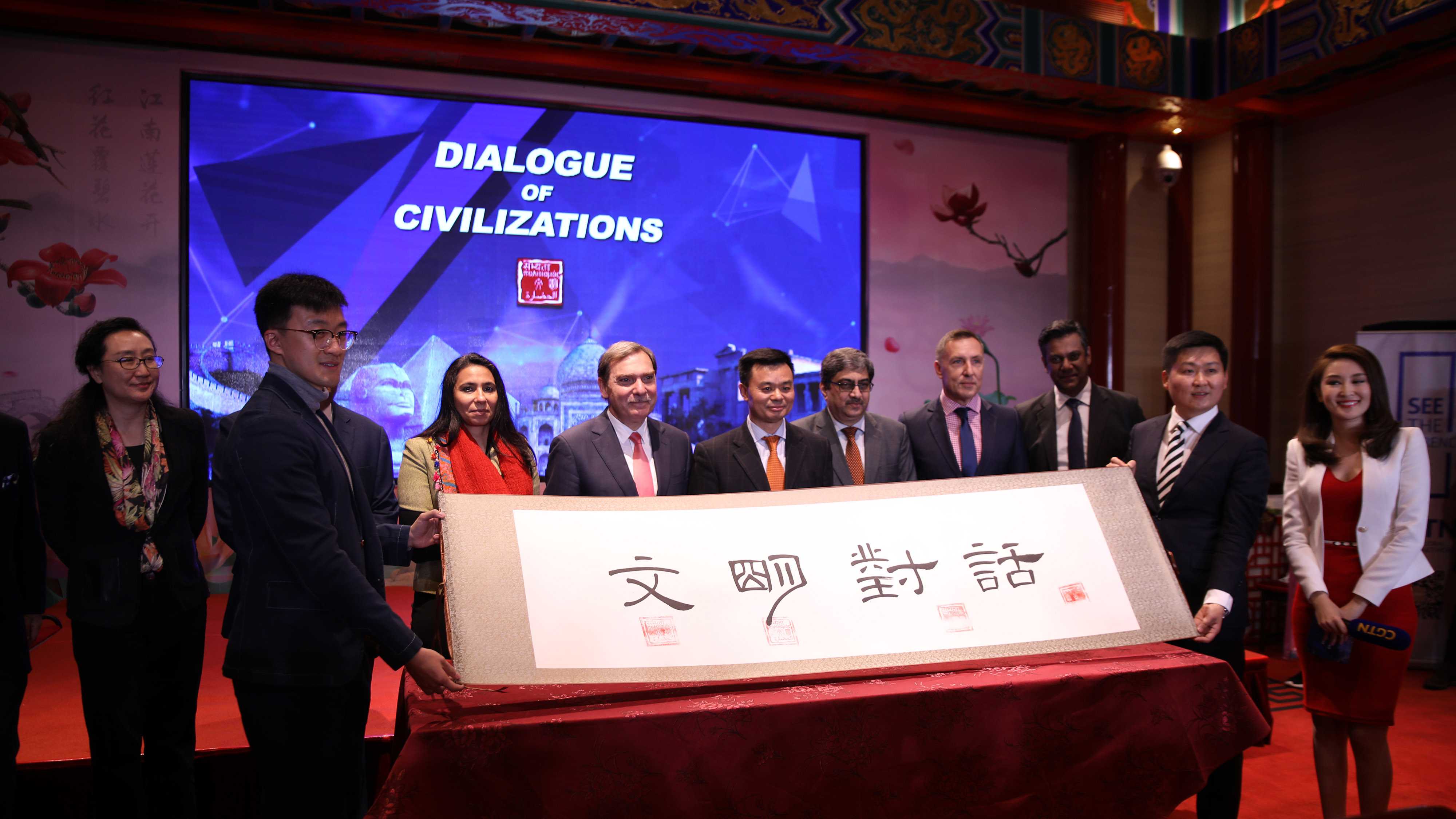
Languages and words and the meaning they convey are the most crucial elements of any dialogue. This aspect was most effectively on display at the inauguration of the first edition of "Dialogue of Civilizations" TV forum in Beijing on Thursday.
CGTN has teamed up with Egypt's Nile TV, India's NDTV and Greece's Hellenic Broadcasting Corporation (or, ERT) for the forum that is poised to witness spirited discussions on cooperation and conflicts between civilizations.
The Greek Ambassador to China Leonidas Rokanas explained the origin of the world "dialogue" from the Greek "dialogos" (conversation between two, or more, rational beings); the Indian Ambassador Gautam Bambawale highlighted the Indian vision through the ancient Sanskrit phrase "vasudhaiva kutumbakam" (meaning "the world is one family"); Egypt's Cultural Counsellor Hussein Ibrahim chose to speak in Mandarin as he made a pictorial presentation of Egypt's history; while Jiang Heping, Deputy Director of the News Center of CCTV and Controller of CGTN, underlined the essential values of Chinese civilization at the opening event of the forum.
01:21
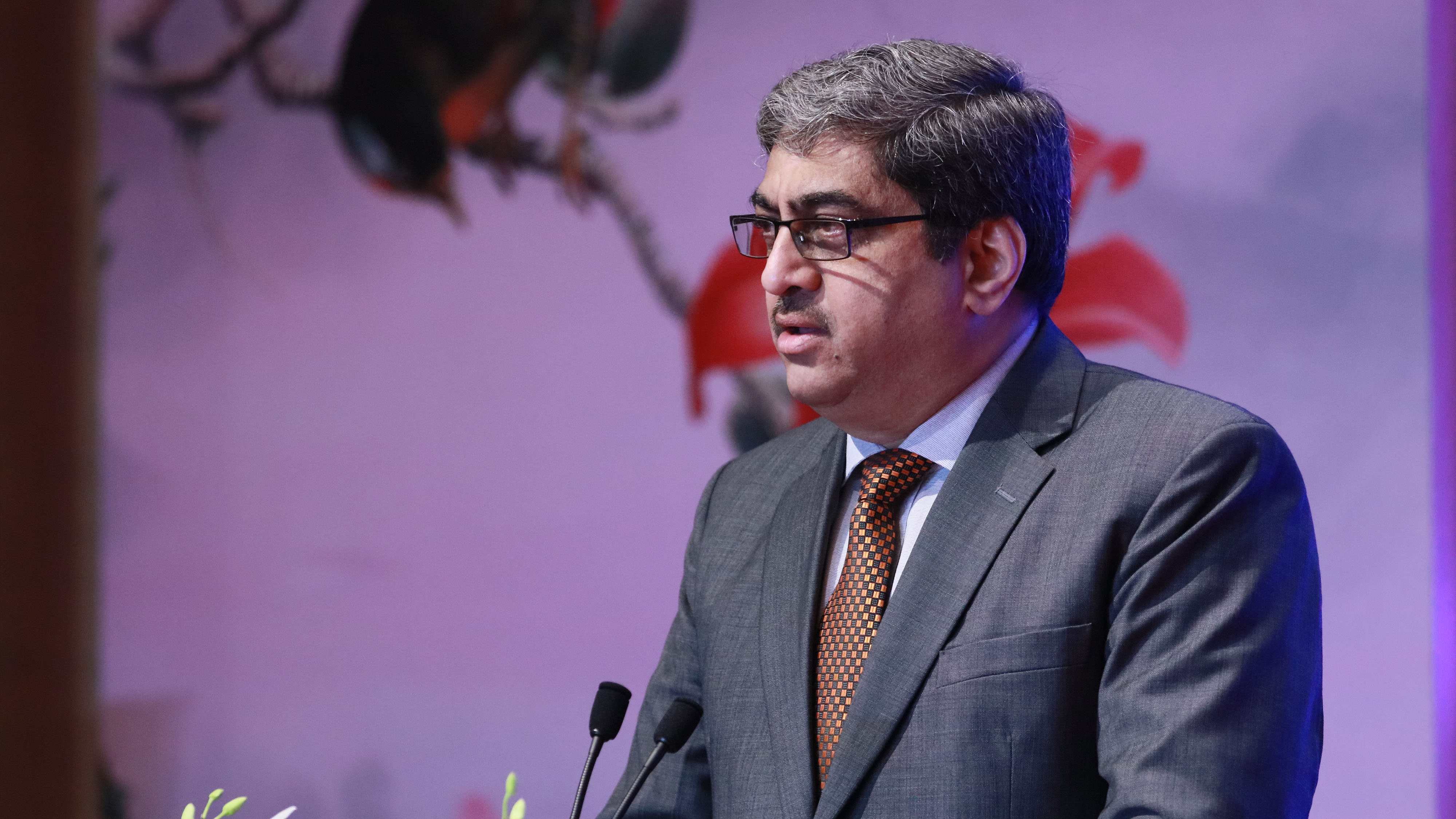
The dignitaries in a symbolic gesture used a special stamp in the shape of the traditional Chinese royal seal with the word "civilization" marked in the four languages – सभ्यता (Hindi, pronounced sabhyata), πολιτισμός, (Greek, pronounced politismós), 文明 (ancient Chinese, pronounced wénmíng) and الحضارة (Arabic, pronounced alhadara) – to officially open the "Dialogue of Civilization".
In his welcoming speech, Jiang pointed out that today's world has banished the ‘Clash of Civilizations' to usher in dialogue and communication. “Both the past and the present have shown that good communication among civilizations are usually the times when conflicts and wars are under effective control. In Chinese civilization, the essential values of mutual appreciation and harmony stress kindness, love and good neighborliness," he said.
"However, at the same time, we also recognize the importance of tolerance and inclusiveness. As a country with a well-preserved and uninterrupted history, we feel it more deeply how the common development of many different civilizations form the foundation of a diverse community. All civilizations are equal and they should be equally respected and appreciated. While handing down our own civilizations, we should also safeguard and promote the diversity of fellow civilizations, which represent the common historical and cultural legacy of humanity," he elucidated.
'Cosmos' is 'one family'
01:06

Indian Ambassador Bambawale stated in his speech that India's vision and approach to the world could be summed up in one Sanskrit phrase, meaning “the world is one family”.
"India has an optimistic view. We believe that there's no clash of civilizations which is about to take place in this world. We believe that there must be a dialogue of civilizations, there must be a dialogue among civilizations and we believe that though human beings may look different, speak different languages and believe in different religions, there is a oneness of humanity which will win through," he stressed.
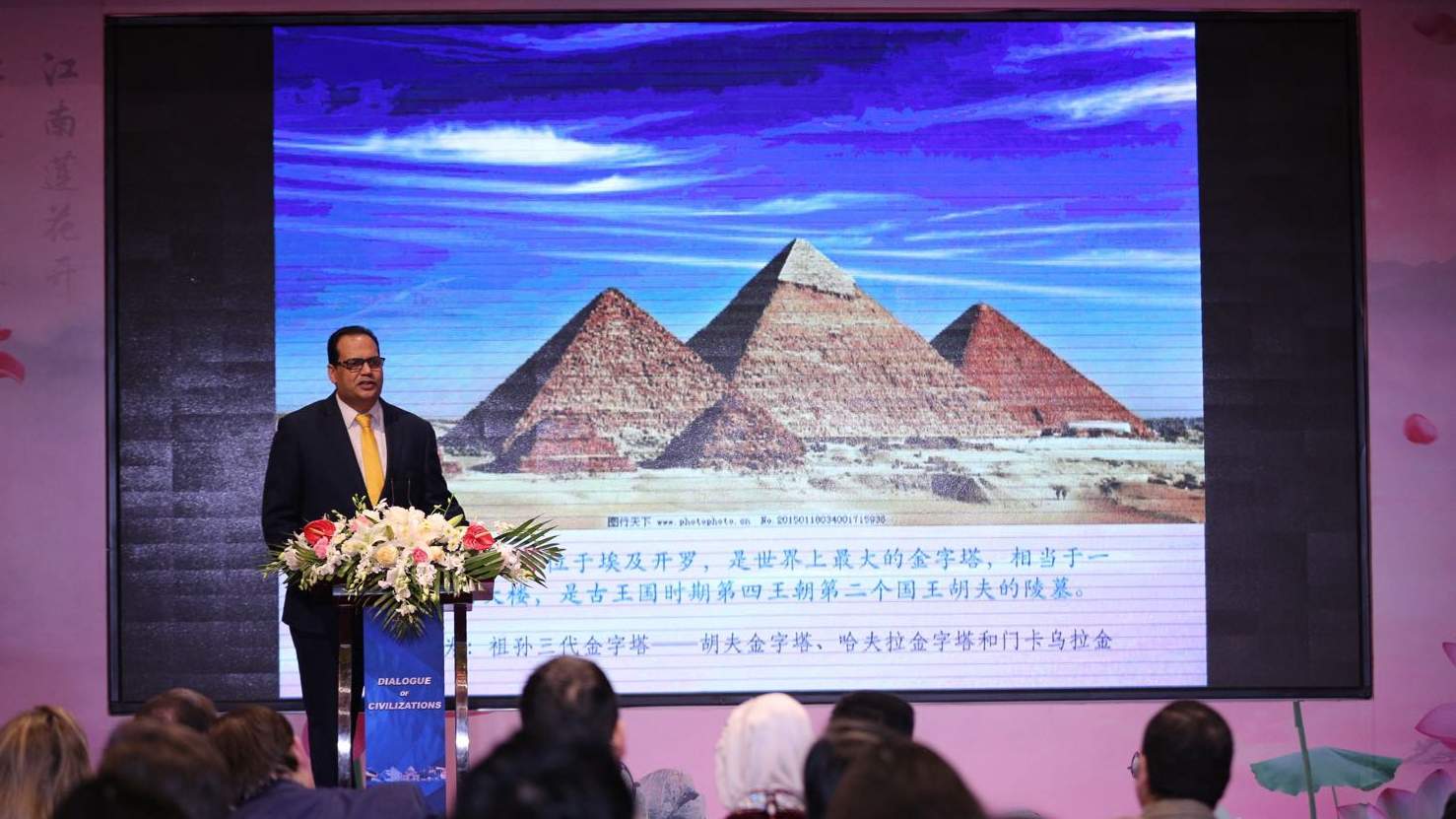
Egyptian Cultural Counselor Hussein Ibrahim delivers his speech in Mandarin at the opening event for CGTN's Dialogue of Civilizations in Beijing, China, November 15, 2018. /CGTN Photo
Egyptian Cultural Counselor Hussein Ibrahim delivers his speech in Mandarin at the opening event for CGTN's Dialogue of Civilizations in Beijing, China, November 15, 2018. /CGTN Photo
Greek Ambassador Rokanas emphasized how the ancient civilization took an aesthetic view of the entire world and humanity. "In Greece we have a word for the world - 'cosmos' – which means jewel. We have a very aesthetic view of what surrounds us. It's not just there, it doesn't just exist but it's beautiful," he said.
Rokanas stressed that civilizations are the key to not only understand how the world evolved, but also how it is moving forward. He stressed that civilizations were created, evolved and co-existed through dialogue, also underlining that the word originates from another Greek word. He praised the TV forum as a wonderful and pertinent initiative, especially when there are many discussions about politics, economics yet few discussions about culture and civilization.
Egyptian Cultural Counselor Hussein Ibrahim introduced the long history of Egypt and concluded that civilizations need cooperation and dialogue, which must be facilitated through languages, bridges, people-to-people exchange, and collaborative initiatives such as “One Belt One Road”.
A multicultural platform
01:15
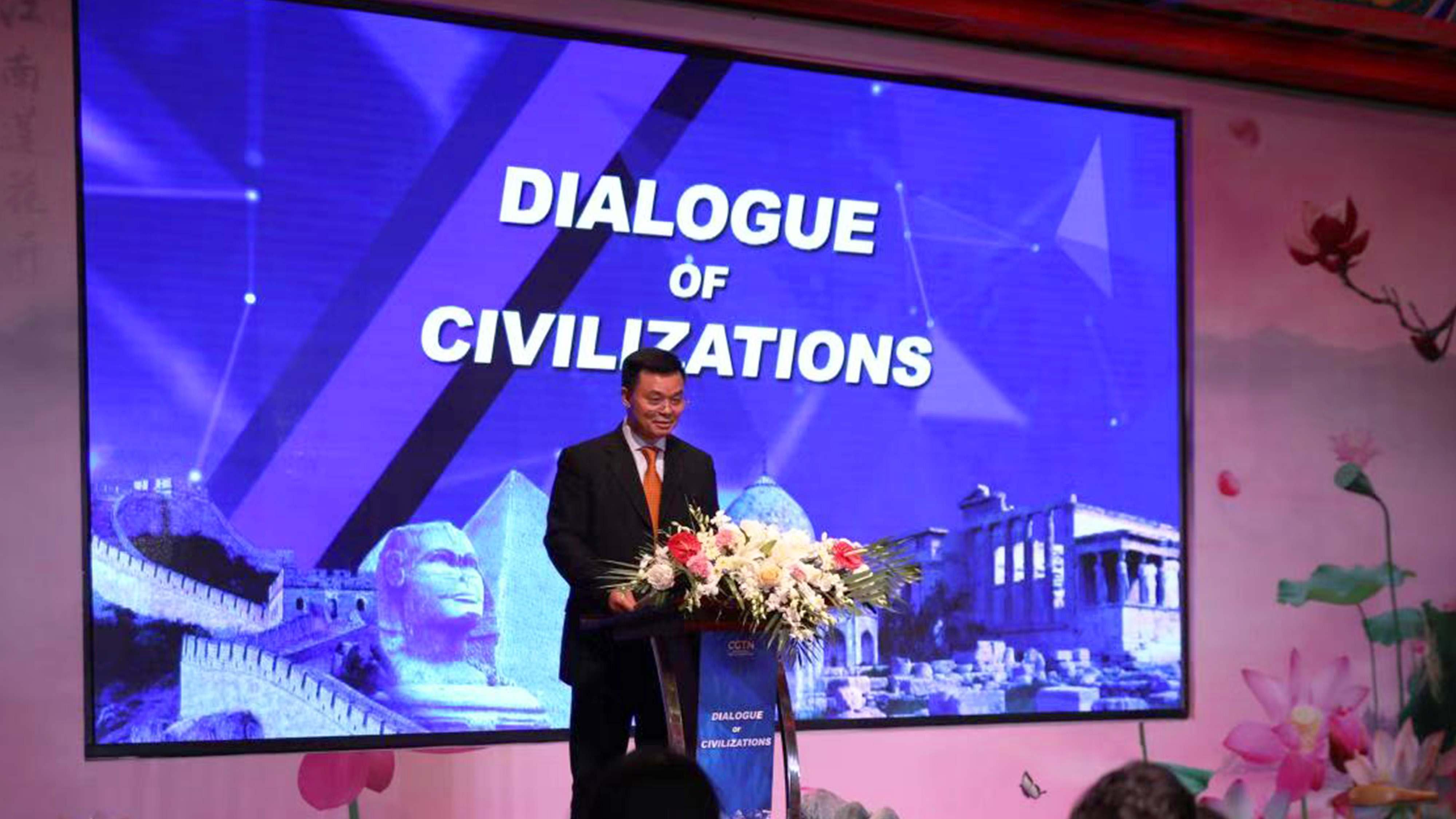
Revealing that "Dialogue of Civilizations" is CGTN's latest endeavor in international exchanges, Jiang expressed hope that it will serve as a multicultural platform against the rise of anti-globalization and nationalism.
"With hosts and presenters from Greece, India, Egypt and China, we hope the discussions will shed new light on the rise and fall of civilization, alert us to the dangers of the clash between civilizations, and examine the world politics and international relations from a fresh perspective," he said.
For the first time, CGTN's primetime talk show Dialogue has invited Mohamed Abdel Rahim Ismail Shalaby Mostafa from Nile TV, Vishnudeep Som from NDTV, and Theofanis Papathanasiou from ERT to join Yang Rui from CGTN to co-host the forum on Dialogue of Civilizations: Cooperation and Conflict.
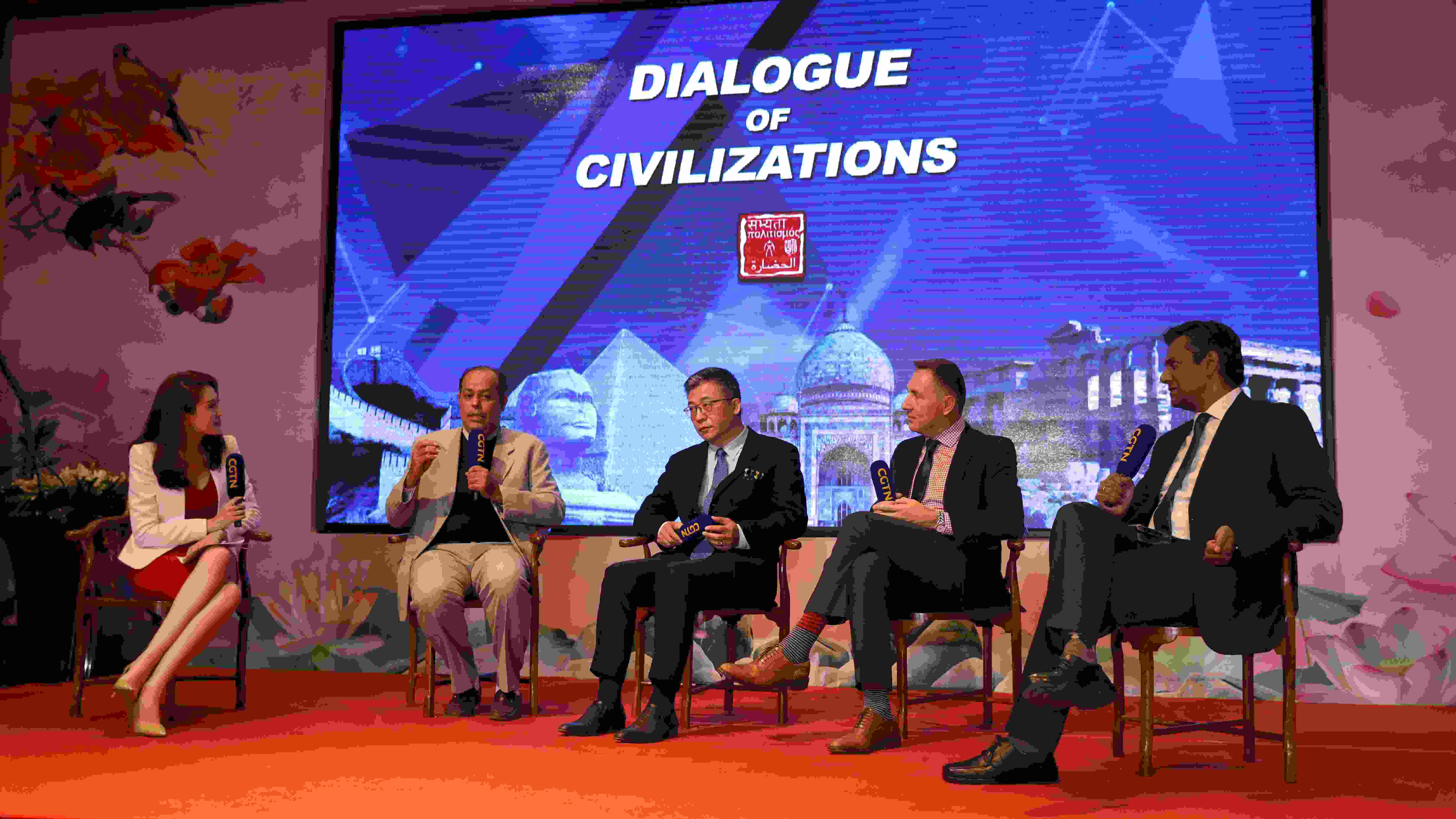
From left: CGTN's Li Qiuyuan hosts a panel discussion with Mohamed Abdel Rahim Ismail Shalaby Mostafa from Nile TV, Yang Rui from CGTN, Theofanis Papathanasiou from ERT, and Vishnudeep Som from NDTV, as part of the opening event for CGTN's Dialogue of Civilizations in Beijing, China, November 15, 2018. /CGTN Photo
From left: CGTN's Li Qiuyuan hosts a panel discussion with Mohamed Abdel Rahim Ismail Shalaby Mostafa from Nile TV, Yang Rui from CGTN, Theofanis Papathanasiou from ERT, and Vishnudeep Som from NDTV, as part of the opening event for CGTN's Dialogue of Civilizations in Beijing, China, November 15, 2018. /CGTN Photo
The event on Thursday also included a lively panel discussion hosted by CGTN's Li Qiuyuan where her fellow television hosts joined as participants. This was followed by a Q&A round with the audience present.
In the television show, the anchors will be joined by Prof. Abdul-Monem Al-Mashat, Dean Faculty of Economics and Political Science at Future University in Egypt, Prof. M D Nalapat, Vice-Chair of the Advanced Research Group and Director of the Department of Geopolitics at Manipal University in India, Leonidas Rokanas, Greek Ambassador to China, and Prof. Huang Jing, Dean of the Institute of International and Regional Studies at Beijing Language and Culture University to have an hour-long discussion and debate on four topics - the conflict of civilizations, the competition of civilizations, the origin of civilizations, and the future of civilizations.
The forum is being co-produced by the four national television networks, and is scheduled to be broadcast simultaneously by all the participating TV channels on Nov. 28, 2018.
0km

SITEMAP
Copyright © 2018 CGTN. Beijing ICP prepared NO.16065310-3
Copyright © 2018 CGTN. Beijing ICP prepared NO.16065310-3